高考英语 考前指导( 各个题型)
- 格式:docx
- 大小:73.31 KB
- 文档页数:23
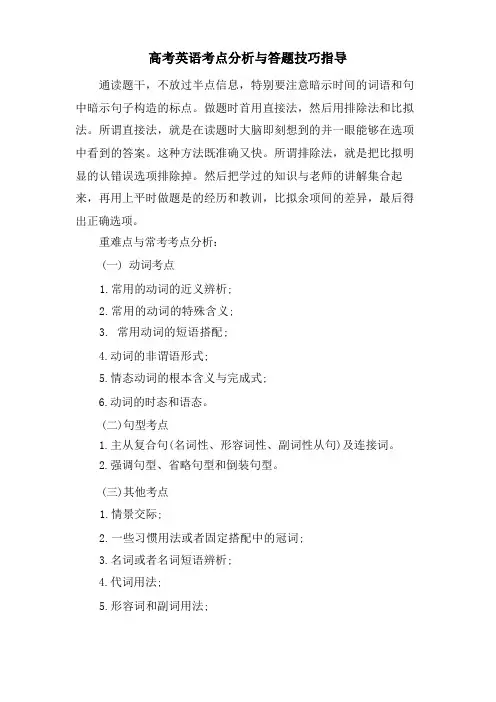
通读题干,不放过半点信息,特别要注意暗示时间的词语和句中暗示句子构造的标点。
做题时首用直接法,然后用排除法和比拟法。
所谓直接法,就是在读题时大脑即刻想到的并一眼能够在选项中看到的答案。
这种方法既准确又快。
所谓排除法,就是把比拟明显的认错误选项排除掉。
然后把学过的知识与老师的讲解集合起来,再用上平时做题是的经历和教训,比拟余项间的差异,最后得出正确选项。
重难点与常考考点分析:(一) 动词考点1.常用的动词的近义辨析;2.常用的动词的特殊含义;3. 常用动词的短语搭配;4.动词的非谓语形式;5.情态动词的根本含义与完成式;6.动词的时态和语态。
(二)句型考点1.主从复合句(名词性、形容词性、副词性从句)及连接词。
2.强调句型、省略句型和倒装句型。
(三)其他考点1.情景交际;2.一些习惯用法或者固定搭配中的冠词;3.名词或者名词短语辨析;4.代词用法;5.形容词和副词用法;6. 介词与介词短语用法。
1.充分利用首句信息完形填空题首句往往不设空,往往是全文的关键句,或者称为主导句,要充分利用完形填空题首句的提示作用,利用它为解题找到一个突破口,从而展开思维。
2.多角度的逻辑推理完形填空题的解题过程首先是一个阅读的过程,必须把握作者的思路,通过联想、猜测等方法,多换角度去思量问题,使自己的思维模式与作者的思维模式相吻合。
3.从上下文寻觅线索通读全文,理顺大意,根据上下文找出信息词是做好完形填空题的关键。
近年高考试题逐渐摈弃单纯的语言分析考查,而越来越侧重逻辑推理判断。
就空格而言,表达了以实词为主、虚词为辅的特点,而且几乎不暴露明显的语言错误,词语在特定的语境中所表达的陷含信息大都无法只凭字面或者单从个别句子甚至假设干句子的外表理解获知。
因此,惟独借助于上下文乃至全文语境的启示或者限定才干够准确作出判断。
4.利用语法分析解题对语法、词法等根抵知识的考查也是完形填空题的命题角度之一。
对于这种题,要针对地对语法构造、句式特点、对短文中所设空格中需填的词在句子里作什么成份、哪种词适合、应采取什么形式等等发展必要的分析思量,从而迅速解决问题。
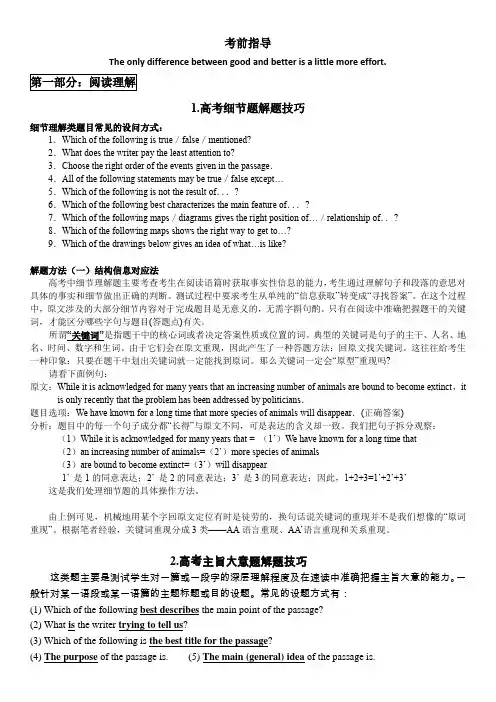
考前指导The only difference between good and better is a little more effort.1.高考细节题解题技巧细节理解类题目常见的设问方式:1.Which of the following is true/false/mentioned?2.What does the writer pay the least attention to?3.Choose the right order of the events given in the passage.4.All of the following statements may be true/false except…5.Which of the following is not the result of...?6.Which of the following best characterizes the main feature of...?7.Which of the following maps/diagrams gives the right position of…/relationship of..?8.Which of the following maps shows the right way to get to…?9.Which of the drawings below gives an idea of what…is like?解题方法(一)结构信息对应法高考中细节理解题主要考查考生在阅读语篇时获取事实性信息的能力,考生通过理解句子和段落的意思对具体的事实和细节做出正确的判断。
测试过程中要求考生从单纯的“信息获取”转变成“寻找答案”。
在这个过程中,原文涉及的大部分细节内容对于完成题目是无意义的,无需字斟句酌。
只有在阅读中准确把握题干的关键词,才能区分哪些字句与题目(答题点)有关。
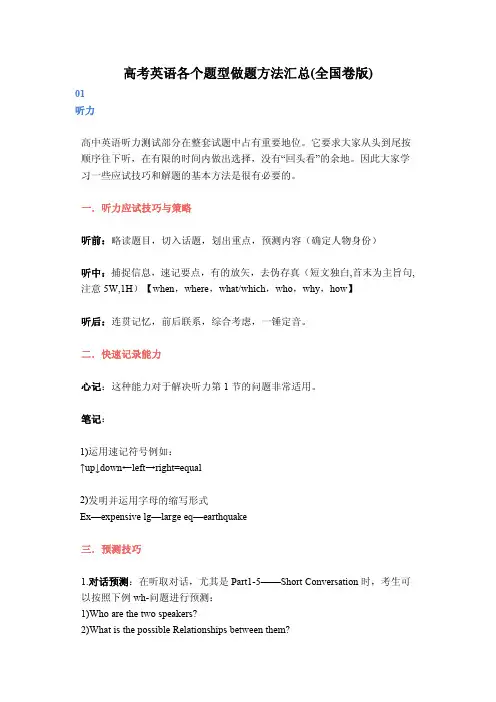
高考英语各个题型做题方法汇总(全国卷版)01听力高中英语听力测试部分在整套试题中占有重要地位。
它要求大家从头到尾按顺序往下听,在有限的时间内做出选择,没有“回头看”的余地。
因此大家学习一些应试技巧和解题的基本方法是很有必要的。
一.听力应试技巧与策略听前:略读题目,切入话题,划出重点,预测内容(确定人物身份)听中:捕捉信息,速记要点,有的放矢,去伪存真(短文独白,首末为主旨句,注意5W,1H)【when,where,what/which,who,why,how】听后:连贯记忆,前后联系,综合考虑,一锤定音。
二.快速记录能力心记:这种能力对于解决听力第1节的问题非常适用。
笔记:1)运用速记符号例如:↑up↓down←left→right=equal2)发明并运用字母的缩写形式Ex—expensive lg—large eq—earthquake三.预测技巧1.对话预测:在听取对话,尤其是Part1-5——Short Conversation时,考生可以按照下例wh-问题进行预测:1)Who are the two speakers?2)What is the possible Relationships between them?3)When did they have the conversation?4)Where did the conversation take place?5)Why do they have the conversation?6)What did they plan to do?2.语篇预测:了解讲话者已提供和未提供的信息1)What facts did the speaker offer?2)What facts did the speaker fail to offer?3.依靠开篇句预测:英语听力的第一句话通常会透露整篇的主题,所以大家要善于抓住听力材料的首句信息。
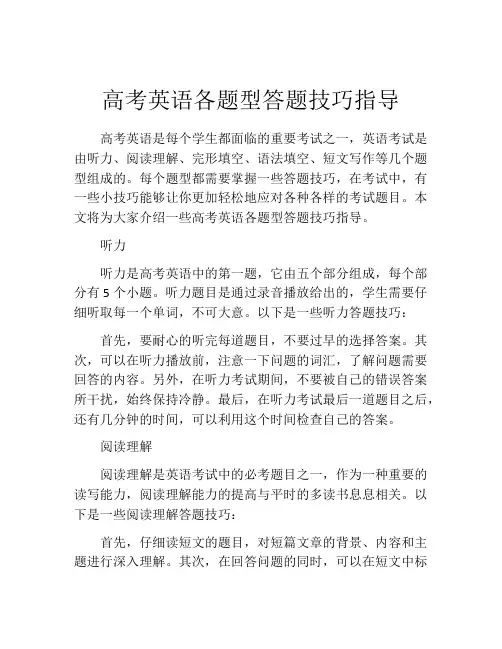
高考英语各题型答题技巧指导高考英语是每个学生都面临的重要考试之一,英语考试是由听力、阅读理解、完形填空、语法填空、短文写作等几个题型组成的。
每个题型都需要掌握一些答题技巧,在考试中,有一些小技巧能够让你更加轻松地应对各种各样的考试题目。
本文将为大家介绍一些高考英语各题型答题技巧指导。
听力听力是高考英语中的第一题,它由五个部分组成,每个部分有5个小题。
听力题目是通过录音播放给出的,学生需要仔细听取每一个单词,不可大意。
以下是一些听力答题技巧:首先,要耐心的听完每道题目,不要过早的选择答案。
其次,可以在听力播放前,注意一下问题的词汇,了解问题需要回答的内容。
另外,在听力考试期间,不要被自己的错误答案所干扰,始终保持冷静。
最后,在听力考试最后一道题目之后,还有几分钟的时间,可以利用这个时间检查自己的答案。
阅读理解阅读理解是英语考试中的必考题目之一,作为一种重要的读写能力,阅读理解能力的提高与平时的多读书息息相关。
以下是一些阅读理解答题技巧:首先,仔细读短文的题目,对短篇文章的背景、内容和主题进行深入理解。
其次,在回答问题的同时,可以在短文中标记出关键信息,以帮助自己正确回答问题。
另外,可以注意选项的差异,准确的判断选项之间的细微差别,以便正确使用符号。
最后,在答题期间不要过度追求完美。
如果你不确定答案,请选最接近自己的想法的选项。
完形填空这是高考英语的又一篇必考题型。
完形填空要求学生根据短文的内容选择正确的单词或短语来填写空白,加强学生对语法和词汇的了解和应用。
以下是一些完形填空答题技巧:首先,阅读整篇文章,了解文章大意并尝试根据上下文猜出填空单词或短语的意思,以帮助自己更好地回答问题。
其次,注意要选择与文章连贯的单词或短语,以保证文章的逻辑连续性。
另外,可以利用语法规则和选项之间的语法差异,进一步辨别正确答案。
最后,如果不确定答案,不妨选择一个适当的一个选项,不要空着这个选项。
语法填空语法填空是英语考试中的又一项重要题型,考查学生的填写单词的能力。

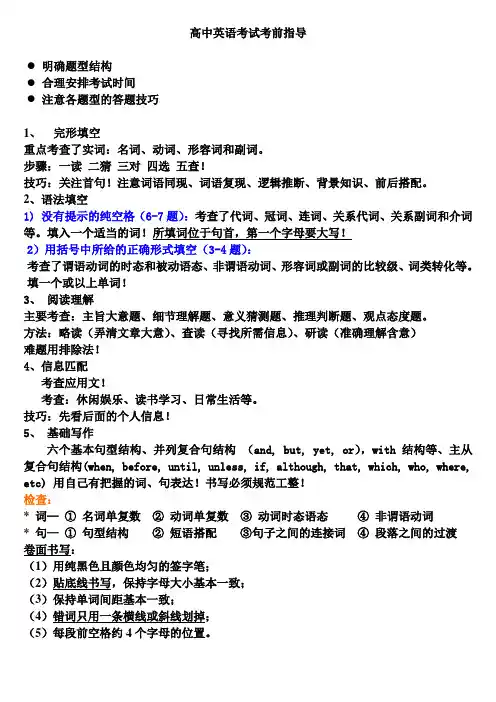
高中英语考试考前指导●明确题型结构●合理安排考试时间●注意各题型的答题技巧1、完形填空重点考查了实词:名词、动词、形容词和副词。
步骤:一读二猜三对四选五查!技巧:关注首句!注意词语同现、词语复现、逻辑推断、背景知识、前后搭配。
2、语法填空1) 没有提示的纯空格(6-7题):考查了代词、冠词、连词、关系代词、关系副词和介词等。
填入一个适当的词!所填词位于句首,第一个字母要大写!2)用括号中所给的正确形式填空(3-4题):考查了谓语动词的时态和被动语态、非谓语动词、形容词或副词的比较级、词类转化等。
填一个或以上单词!3、阅读理解主要考查:主旨大意题、细节理解题、意义猜测题、推理判断题、观点态度题。
方法:略读(弄清文章大意)、查读(寻找所需信息)、研读(准确理解含意)难题用排除法!4、信息匹配考查应用文!考查:休闲娱乐、读书学习、日常生活等。
技巧:先看后面的个人信息!5、基础写作六个基本句型结构、并列复合句结构(and, but, yet, or),with 结构等、主从复合句结构(when, before, until, unless, if, although, that, which, who, where, etc) 用自己有把握的词、句表达!书写必须规范工整!检查:* 词—①名词单复数②动词单复数③动词时态语态④非谓语动词* 句—①句型结构②短语搭配③句子之间的连接词④段落之间的过渡卷面书写:(1)用纯黑色且颜色均匀的签字笔;(2)贴底线书写,保持字母大小基本一致;(3)保持单词间距基本一致;(4)错词只用一条横线或斜线划掉;(5)每段前空格约4个字母的位置。
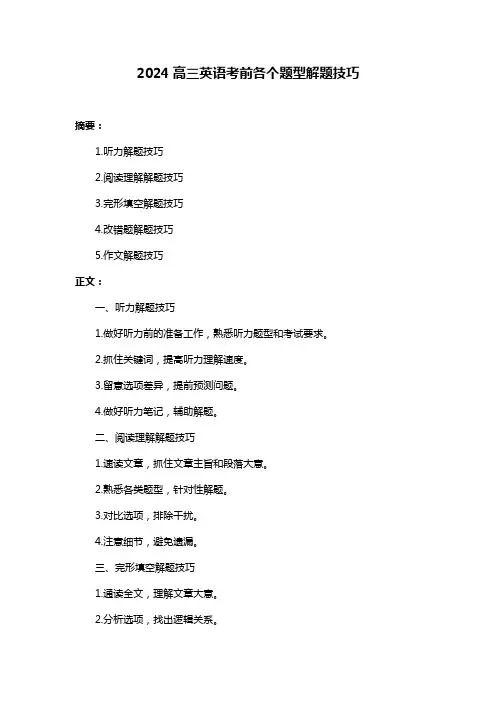
2024高三英语考前各个题型解题技巧
摘要:
1.听力解题技巧
2.阅读理解解题技巧
3.完形填空解题技巧
4.改错题解题技巧
5.作文解题技巧
正文:
一、听力解题技巧
1.做好听力前的准备工作,熟悉听力题型和考试要求。
2.抓住关键词,提高听力理解速度。
3.留意选项差异,提前预测问题。
4.做好听力笔记,辅助解题。
二、阅读理解解题技巧
1.速读文章,抓住文章主旨和段落大意。
2.熟悉各类题型,针对性解题。
3.对比选项,排除干扰。
4.注意细节,避免遗漏。
三、完形填空解题技巧
1.通读全文,理解文章大意。
2.分析选项,找出逻辑关系。
3.注重语境,突破固定搭配。
4.反复阅读,检查答案。
四、改错题解题技巧
1.分析错误类型,如语法、词汇、拼写等。
2.对照选项,找出正确答案。
3.结合语境,判断正确性。
4.检查整体文章,确保语法正确。
五、作文解题技巧
1.审题准确,明确作文主题。
2.构思清晰,组织合理。
3.使用高级词汇和表达,提高作文水平。
4.注意行文规范,避免语法错误。
5.结尾总结,呼应主题。
在高考英语考试中,掌握各题型的解题技巧至关重要。
通过以上五个方面的详细解析,希望能帮助同学们在考试中取得优异成绩。
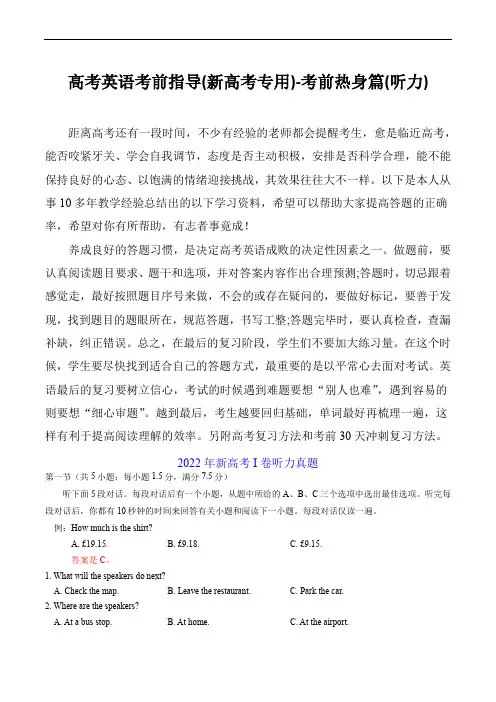
高考英语考前指导(新高考专用)-考前热身篇(听力)距离高考还有一段时间,不少有经验的老师都会提醒考生,愈是临近高考,能否咬紧牙关、学会自我调节,态度是否主动积极,安排是否科学合理,能不能保持良好的心态、以饱满的情绪迎接挑战,其效果往往大不一样。
以下是本人从事10多年教学经验总结出的以下学习资料,希望可以帮助大家提高答题的正确率,希望对你有所帮助,有志者事竟成!养成良好的答题习惯,是决定高考英语成败的决定性因素之一。
做题前,要认真阅读题目要求、题干和选项,并对答案内容作出合理预测;答题时,切忌跟着感觉走,最好按照题目序号来做,不会的或存在疑问的,要做好标记,要善于发现,找到题目的题眼所在,规范答题,书写工整;答题完毕时,要认真检查,查漏补缺,纠正错误。
总之,在最后的复习阶段,学生们不要加大练习量。
在这个时候,学生要尽快找到适合自己的答题方式,最重要的是以平常心去面对考试。
英语最后的复习要树立信心,考试的时候遇到难题要想“别人也难”,遇到容易的则要想“细心审题”。
越到最后,考生越要回归基础,单词最好再梳理一遍,这样有利于提高阅读理解的效率。
另附高考复习方法和考前30天冲刺复习方法。
2022年新高考I卷听力真题第一节(共5小题;每小题1.5分,满分7.5分)听下面5段对话。
每段对话后有一个小题,从题中所给的A、B、C三个选项中选出最佳选项。
听完每段对话后,你都有10秒钟的时间来回答有关小题和阅读下一小题。
每段对话仅读一遍。
例:How much is the shirt?A. £19.15.B. £9.18.C. £9.15.答案是C。
1. What will the speakers do next?A. Check the map.B. Leave the restaurant.C. Park the car.2. Where are the speakers?A. At a bus stop.B. At home.C. At the airport.3. What did the speakers do last week?A. They had a celebration dinner.B. They went to see a newborn baby.C. They sent a mail to their neighbors.4. Why does the man make the phone call?A. To cancel a weekend trip.B. To make an appointment.C. To get some information.5. What does the man probably want to do?A. Do some exercise.B. Get an extra key.C. Order room service.第二节(共15小题;每小题1.5分,满分22.5分)听下面5段对话或独白。
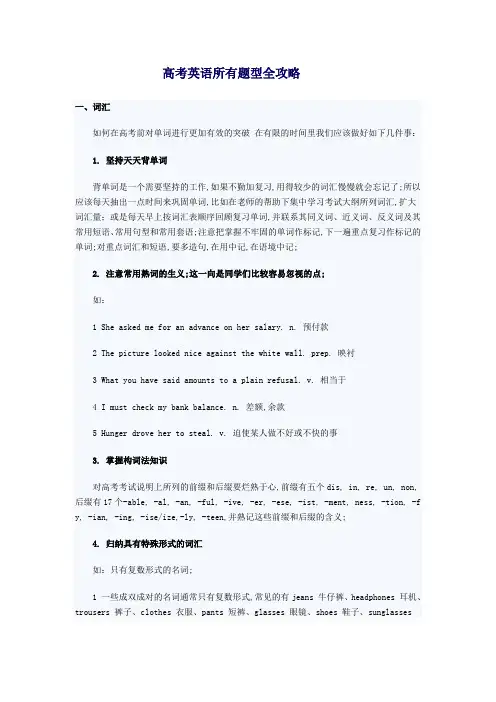
高考英语所有题型全攻略一、词汇如何在高考前对单词进行更加有效的突破在有限的时间里我们应该做好如下几件事:1. 坚持天天背单词背单词是一个需要坚持的工作,如果不勤加复习,用得较少的词汇慢慢就会忘记了;所以应该每天抽出一点时间来巩固单词,比如在老师的帮助下集中学习考试大纲所列词汇,扩大词汇量;或是每天早上按词汇表顺序回顾复习单词,并联系其同义词、近义词、反义词及其常用短语、常用句型和常用套语;注意把掌握不牢固的单词作标记,下一遍重点复习作标记的单词;对重点词汇和短语,要多造句,在用中记,在语境中记;2. 注意常用熟词的生义;这一向是同学们比较容易忽视的点;如:1 She asked me for an advance on her salary. n. 预付款2 The picture looked nice against the white wall. prep. 映衬3 What you have said amounts to a plain refusal. v. 相当于4 I must check my bank balance. n. 差额,余款5 Hunger drove her to steal. v. 迫使某人做不好或不快的事3. 掌握构词法知识对高考考试说明上所列的前缀和后缀要烂熟于心,前缀有五个dis, in, re, un, non,后缀有17个-able, -al, -an, -ful, -ive, -er, -ese, -ist, -ment, ness, -tion, -f y, -ian, -ing, -ise/ize,-ly, -teen,并熟记这些前缀和后缀的含义;4. 归纳具有特殊形式的词汇如:只有复数形式的名词;1 一些成双成对的名词通常只有复数形式,常见的有jeans 牛仔裤、headphones 耳机、trousers 裤子、clothes 衣服、pants 短裤、glasses 眼镜、shoes 鞋子、sunglasses太阳镜、scissors 剪刀、compasses 圆规;这些名词可单独作主语,动词用复数形式,也可用...pair/pairs of修饰,作主语时动词取决于pair的形式;2一些食物名词只有复数形式,常见的有noodles, vegetables, snacks;3 一些固定短语中的名词只有复数形式,常见有的express one's thanks to sb. 向某人表达感激之情, a letter of thanks 一封感谢信, in high/low spirits 情绪高涨/低落, have sports 进行体育活动;4 一些不可数名词只有复数形式,但却表示单数概念,常见的有news 消息, means 手段;As we all know, no news is good news. 众所周知,没有消息就是好消息;5 一些专有名词只有复数形式,但却表示单数概念,常见的有:the United States 美国、the United Nations 联合国、the United Kingdoms 英国、the Arabian Nights 一千零一夜;5. 坚持每天阅读在记忆词汇的同时,每天要安排相应的阅读理解,完形填空和短文改错或阅读表达练习,这是为了让所记忆的词汇在具体的语言环境中得以再现和运用,强化自己所记的词汇;另一方面,还可以加强自己对语言信息的捕获速度;二、听力:高考英语听力的“弦外之音”作者:钱英婧对于高考听力,把握考查测试点和相关技巧是非常重要的,下面就常见的高考听力考点做一下归纳和总结; 一、数字;数字型试题主要考查数字,包括数量、年龄、时间、价格等,可以出现在听力考试的所有题型中;针对不同的数字型试题,考生可以采取记录、判断以及推断等不同技巧进行答题;提示1:如对电话号码、门牌号、航班号、车牌号等,考生可采取听写记录所需数字;提示2:对判断类数字题需要在听到的两个或两个以上数字中判断符合题意的数字;提示3:对推断类数字题则通常涉及到简单的数学四则运算,需稍加计算,才能得出正确答案;二、地点;地点型试题主要考查地点,该项内容的考查多为以where开头的特殊疑问句,如:Where does the conversation most probably take place这段对话最可能发生在什么场合解这类试题时,我们需要有一些积累和推断;提示1:熟悉、积累常用地名,如国家、首都、大城市、著名的标志性建筑以及著名山川河流的名称等;提示2:熟悉、积累与各个地点场所有关的单词、短语、句型和场景;提示3:根据对话内容,结合生活常识进行逻辑推断,从而得知对话发生地点;由于地点型试题可能出现在填空中,因此考生还需要注意地点名称的大小写,做到拼写准确规范;三、推断;推断型试题不仅包括推断数字和地点,还常考查学生对人物身份、关系,人物态度、情感以及事件原因的推断;一般来说,此类题通常出现在短对话中;提示1:平时熟悉、积累不同人物身份及人物关系所对应的单词、短语、句型和场景,测试时根据对话内容所提供的称呼语、关键词,结合生活常识进行判断;提示2:熟悉、积累不同语音语调所表达的不同意思,以及特定单词、短语和句型所表达的隐含信息,进行准确判断;提示3:认真听清事件发生的全部过程及前因后果,去粗取精,去伪存真,才能找出事件发生的真正原因;四、主题内容;主题型试题主要考查学生对短对话或短文独白的主要内容的把握能力;学生需要抓住关键字或主题句,根据所获得的关键信息,进行分析概括主题;补充资料:听力常见词汇及句型一级重要词汇:reserve/reservation, reception/receptionist/reception ,desk,register/regist ration/book 名词:rent, style, reservation, conference, grades, return flights, accommodation, details, destination, flat/apartment, section, a king’s room, s hower, deadline, 动词:reserve, spare, register, sign, appreciate, 形容词:avai lable, amazing, scaring, boring, incredible, grand, extra, awful, digital, punc tual, 副词:definitely, down, though, slightly, 词组:check out, start off, loo k into, now that, in a long run, on behalf of, bound for, apart from, tour/scenic spots, take/leave a message, drop in on/at, put sb. at ease, drop sb. off, i n stock, 句型:all set your time. but cheap. wonder…’s a deal. ’re kidding. we make it…’s the way it is. depends. ’s not intended for scientists, either.经过对近五年的全国卷英语试题单项选择部分的总结,我们的出入下结论:全国卷的考题在知识广度上有很好的体现,对中学阶段要求学生掌握的语法项目都有较完整的覆盖面,而且试题对知识点的考查很细;这就要求考生在复习备考中应注意把握词汇的基本用法和基本句法知识,不能有遗漏现象,不能有侥幸心理,不能顾此失彼;三、高考必考英语知识清单:考点1 冠词考点2 名词考点3 代词考点4 形容词/副词考点5 定语从句考点6 状语从句考点7 名词性从句考点8 时态、语态考点9 非谓语动词考点10 情态动词考点11 动词及动词短语辨析考点12 倒装语序考点13 主谓一致关系、强调结构及其他考点14 日常交际用语下面我们对部分考点给出具体的复习重点指导:一、状语从句的一些引导词需要着重注意: …before I could say a word./It may be some time before the situation imp roves How long it’ll be before I can go back to work: It was six o’clock when they arrived at the hotel. : It’s three years since I smoked. : Great as the difficulty w as,../Much as I admire,…: They notice that plants don’t grow well where there is much shade. My do ctor advised me to live where the air is fresher. 6.主将从现:I can when my headache disappear thoroughly. If you go, so will I. 二、时态和语态是很重要的考点have been painting all day/be always doing/I did lock it/will still be slee ping/will have left The papers are still being corrected/It is being served in the dining room. 三、注意情态动词对过去表示推测的用法比如,couldn’t have done/might have done/needn’t have done/should/ought to have done 特别是shall的用法: No student shall go out of school without the tea cher’s permission. Tell him that he shall have the wonderful book tomorrow aft ernoon. It is the rule that every driver shall obey in this city. Shall I/he bo ok a table请别忽视某些情态动词的特殊含义,如:must : If you must know her name, her name is Mabel. would: When I was youn g, I would sit under the old tree listening to grandpa tell me stories. should: It’s strange that Tom, the most excellent student in our grade should fail in the exam. may: May you succeed/May you be happy 四、你需要记住一些交际用语,比如:Just in case/Take your time/Take it easy/You can’t be serious/Up to you/Wh at if/Can you make it/What for/What kept you/Of what/Exactly/With pleasure/That isn’t due yet./The early train is due to leave at 5:30 ./I’ll give you a lif t./Why not/You are wanted on the phone. 五、非谓语动词——注意分清谓语与非谓语,比如:She went to the market, bought some bananas and visited her cousin. She sai d, and turning away from him, walked rapidly away. Go straight ahead, and you w ill see a hotel in front of you.四、完形填空:高考完形填空临场技法作者:杨圣柱完形填空就是在一篇语意完整的短文中有目的地制造一些空白,造成信息链的中断,让考生在理解短文的基础上,综合运用所学知识和常识,对每个题的备选项做出尽可能合理的分析、判断,从中选出正确答案或最佳答案,使重新构建的文章主旨鲜明,文意畅达,逻辑严密;要做好完形填空,考生须具备扎实的基础知识以及快速阅读和理解的能力,另外,良好的心理素质和思维品质也至关重要;有些考生虽然具有一定的基础,但完形填空题的得分却总不尽如人意;他们的问题概括起来主要有以下几方面:1. 不善于抓文章的主旨大意,并以此为中心展开对整篇文章的推理、判断,导致理解上出现偏差,甚至与文章的中心相悖;2. 容易受定势思维的干扰,对文意分析不透,忽视特定语境中英语知识的运用;3. 对完形填空怀有厌倦、恐惧心理,以至做完形填空时处于应付状态;那么,怎样才能提高做完形填空的准确率呢大家应从以下三个方面入手训练思维能力和解题技巧:抓准主旨、透析文意、理清逻辑;并在做题的过程中把这三方面与做完形填空的三大步骤“浏览、细读和验证”做到有机结合,明确每一步思维的主攻方向;一、通览全文,抓准主旨有的同学或是急于求成,总想“一步到位”,或是由于原文设置空格所造成的理解障碍,担心通读文章时不但抓不住大意反而浪费时间,未通览全文即边读边填,结果是就句论句,无法形成连贯的思路,或“见木不见林”,理解偏离文章的中心,欲速则不达;大家首先要克服不良心理,满怀信心,全神贯注,目光越过空格,注重把握文章的整体内容,注意能体现文章大意的关键词句;开始阅读时可能会有模模糊糊,类似“钻山洞”的感觉,此时千万不可半途而废;再往下读,文意会逐渐显露,读完全文心里往往会有“豁然开朗”之感;另外,要重视文章首句的作用,一般情况下,首句不设空格,这就为大家窥视文章全貌提供了一个“窗口”;通过文章的首句大家可以对文章进行比较准确的定位;另外,大家要给文章准确定位,不仅要重视文章的首句,有时注意一下文章的结尾,首尾联系起来,对文章的定位会更准确;抓住文章的主旨大意后,考生围绕主旨大意去阅读、预测、推理、判断,往往会收到事半功倍的效果;抓住了主旨,一些干扰性强,容易使人犯想当然错误的选项也就起不到作用了;二、细读全文,透析文意有的考生在做完形填空题时,一看到一些自己比较熟悉的语法结构,如句子、短语等,便不假思索地去选,对特定的语境不去作深入的理解,导致“定势思维”错误;事实上,从NMET完形填空的出题特点看,其干扰项的设置均与“语法结构”错误无关,重在文意的干扰,这是出题者近几年始终坚持的方向;NMET完形填空每个题的四个选项并不是一种单纯的词汇辨析,因为从语法的角度看每个选项都是正确的;因此是否能恰如其分地传达文意才是选择正确答案或最佳答案的唯一标准,要吃透文意,理解到位,大家应做到以下几点:1. 注意上下文的内在联系断章取义,就题论题,忽视上下文的信息提示是学生常犯的错误;考生在做完形填空的过程中,应学会边读边在大脑中储藏上下文的信息;信息提示有时出现在前面,有时出现在后面;如:Eating spaghetti 意大利面条caught my eye. The word “spaghetti” brought b ack the 36 of an evening at Uncle Alien’ s in Belleville when _37_ all of us w ere seated around the table and Aunt Pat served _38_ spaghetti for supper.2004全国卷I36. A. memory B. thought C. knowledge D. experience 本题的信息提示出现在前面;做题的关键在于把握brought back与后面名词的搭配关系,即动词短语决定了名词的选择;bring back“把……带回来”,因此此处只能是“把过去的记忆带回来”,即“使人回忆起……”,因此答案只能是A;With these words I began to face _36_ the problem, the problem of my teleph one addiction. I used to call people _37_ , from the moment I woke up to the ti me I went to sleep. I waited _38_ to be phoned, I wanted to phone. Just one mor e call.2004全国卷Ⅱ37. A. now and then B. all the time C. at home D. at work 本题的信息提示出现在后面;空后的“从早晨醒来到上床睡觉”说明前面的动作是“经常、不断的”,因此答案只能是B;2. 注意英汉两种语言的差异,不能简单地互译出题者深知学生在英语学习过程中的弱点,往往从母语的角度设置干扰项来增加试题难度,考查学生的基本功和灵活运用能力,所以在平常的学习中,要逐渐培养自己的“语感”,不要受母语的影响;It started socially —a few calls each day. It seemed fine _39_ , just a qu ick chat. Gradually though, the situation _40_ got worse. Soon it was _41_ use, until, finally, addiction. 2004全国卷Ⅱ41. A. frequent B. regular C. unusual D. particular 本题如果仅凭汉语思维“经常用”电话,很容易误选B, regular虽然也有“经常的”的意思,但侧重指“固定的,有规律的”,不是一个贬义词;因此此处表示最后作者打电话上瘾之前,打电话是一种“频繁的”行为,含有贬义,因此用“频繁的”,表示行为“过火”,答案为A;3. 研读细节,准确认定语境用学生平日常见的固定搭配来干扰学生对具体语境的认定,利用定势思维来增强试题的诱惑性;如:I was phoning people and leaving _46_ messages to make sure _47_ calls woul d see me through the day. 2004全国卷Ⅱ47. A. long B. immediate C. enough D. surprising 本题仅看前面和后面介词短语的搭配,很容易误选A;但仔细推敲语境,此处并不表示电话的“长度”,而表示电话的“数量”,因此应选C;4. 发挥逻辑思维能力,挖掘文章寓意、隐意近几年NMET完形填空以叙事为主,有时加入一定的议论和说明,内容贴近生活,表层意思易于理解,所以很容易给学生造成一种“假象”,产生“轻敌”心理,有些同学做完一篇完形填空以后,自我感觉不错,但一对答案错很多,原因是这些同学仅仅理解了文章的表层含义,而忽略了其深层含义;事实上,NMET完形填空文章大都包含一定的哲理、寓意,具备深层探询的可能性;这就要求考生不仅要明确文章的表层意义,还要挖掘出文章的深层含义,做到“表里一致”;如:_52_ laughed, then the whole class was laughing with open hearted enjoyment.I did my best not to show pleasure _53_ , but what I was feeling was pure happ iness. 52. A. People B. Nobody C. Somebody D. I 本题要求根据事情发展的逻辑关系来判定答案;答案是C,此处叙述作者的作文给全班同学带来欢乐的过程,先是“有人”发笑,最后全班同学大笑,逻辑通顺;5. 结合生活常识判断At first, everyone on the team got _38_ playing time. Then the team moved u p to the top division after winning all its games, and the _39_ started. Some p arents, who had paid the coach extra so their daughters could have _40_ oneonon e training, got angry when she didn’t give them more playing time in our _41_ . The coach was replaced. 2004北京高考38. A. great B. equal C. right D. extra 39. A. business B. struggle C. atte mpt D. pressure 40. A. free B. private C. good D. basic 41. A. matches B. cours es C. lessons D. programs 本文介绍作者一个少年女子足球队员踢足球的经历;一开始,我们得到“平等的38”踢球时间;然后当我们的队获得联赛冠军以后,怎样呢结合生活常识判断,应是有了“压力39”;后面父母贿赂教练干什么呢根据生活常识判断,应该是让自己的孩子得到“开小灶”的机会,因此40应选B, private“私人的”;41,父母生气是因为贿赂没有起作用,也就是在我们的“比赛”中,他们的女儿没有得到更多的上场比赛的时间;三、全面验证,理清逻辑NMET完形填空所选文章都堪称精品,其逻辑必是上下贯通,其脉络也必是自然有序,令人信服;因此,做完一篇完形填空以后,大家对文章的线索、脉络以及主旨、寓意等心里也应该有一种很“明朗”的感觉;如果做完以后,还是似懂非懂,犹如“雾里看花”,那就证明你对文章的把握还有问题,还要复读全文,验证答案;大家可以从文章的内在逻辑入手,回味一下,看所选答案是否经得起推敲,是否能自然融入整个语篇,如果有游离于文章主旨之外或与整篇文章的逻辑相矛盾的答案,就需要重新理解、修正;有的同学做完完形填空以后,不加核查便草草“收场”,结果让很明显的错误从眼前跳过,造成考场上不应有的“遗憾”;五、阅读:阅读理解细节归纳题的纯粹理性作者:刘政从我们学习第一个英语字母开始,一直以来,就企盼得到一个东西,那就是传说中的“语感”;这是英语老师应对同学们各种挑战而屡试不爽的法宝;假如语言的美真的来自于感觉,那么对语言的考察是不是就显得有点神秘抑或荒诞很多同学抱怨,为什么这篇文章我看得懂,却做不对为什么我觉得这道题每个答案都说的通其实很简单,因为很多同学在选答案的时候都不问为什么,而只是“让心灵去旅行”; 高考阅读理解部分在考察过程中,对考生更加注重阅读技巧的运用,而不仅仅是阅读内容的掌握;所以,对于一些阅读能力很强的考生,即使文章读得一知半解,正确率也能保证在80%以上;阅读理解的题材和体裁一直以来都保持多样化的态势,语言材料新、来源广、语言地道、真实,具新颖性、教育性、可靠性和可读性;阅读材料多数来源于最新的国外书报时文,所以要求考生对每篇文章都有亲切感几乎是不可能的;但是,题型设计上,细节、归纳主旨题、推理题和词义题的格局却几乎没有被撼动过,尤其是细节归纳题的核心地位,所以今天我们一起分享一下这两种题型的解答;细节题细节题在每年的高考阅读部分总是能占到半壁以上的江山;细节题的重要性由此可见一斑,然而细节题实则为阅读理解部分最简单的题型;如果考生能在原文中找到对应答题点,想选错几乎是不可能的事情;首先,高考真题的细节题排列,其答题点和题目出现的顺序的意义对应的;以2007年全国二卷B篇为例,61. Which of the following eats only one type of food 62. Certain animals c hange their choice of food when ___________. 答题点分别为…Other animals eat on ly one type of food even when given the choice. A kind of white butterfly蝴蝶w ill stay on the leaves of a cabbage, even though there are plenty of other vege tables in the garden. …The diet of these animals will be different depending o n the season. 因此,如果考生发现该篇文章的第一道题是关于时间、地点、人物、事件等为核心的问题,答案却出现在篇章尾部,那就非常值得怀疑;除了对答题范围的预估,具体的答题的点查找显得更为关键;很多考生都有一个这样的困惑:虽然在看文章前有先看问题的习惯,但总是感觉看来和没看一样,相望了无痕;问题的根源在于,很多考生并不知道在看题干时到底需要看些什么;我们可以举几个例子:06年北京卷72. Why did Loftus ask the volunteers to answer some questions 07年全国二卷65. Right after McKenzie came back, the other children were _____. 08年全国一卷69. In what way is the Snowdonia Centre different from the other two holida ys 08年全国二卷59. Where can visitors have lunch 08年江苏卷64. Parents with small children visiting the gallery 以上是就最近3年高考题中,随机选择的几道细节题题干;考生在预估出卷人意图时并不需要对题干进行细致精到的分析,只需要稍微把握关键词,对句意囫囵吞枣也未尝不可;而这些“枣子”一般是那些不能被消化、被替换的词语,比如:专有名词、术语等,如果没有这些成分,一般名词或动词则应该被关注;数词在考查过程中,虽然会出现一些简单的运算,但因为其形式的独特性,所以也需要特别留意;也就是说,在审题的过程中,关注等级为专有名词、动词、数词;因此,以上五道题,着重关注的点分别是:06年北京卷—Loftus,volunteer;07年全国二卷—McKenzie,children,08年全国一卷—Snowdonia Centre,holidays,08年全国二卷—visitor,lunch,08年江苏卷—parents,children,gallery;当考生在同一个句子,或相邻的句子中看到了这些词,或者近义词,答案就极有可能近在咫尺了;六、归纳题归纳题,有时也被称之为主旨题,主要着眼于对考生事实和观点,现象和本质的区分能力;对于什么是观点、本质,什么是事实、现象,很多考生总觉得有“花非花,雾非雾”的朦胧迷乱感;其实,只要盯住一篇文章的四个角落:首段首句,首段尾句,尾端首句,尾段尾句,就基本上不会出现方向上的偏离;这里的“句”,即可以是一个完整的句子,也可以是复杂句中的主句;比如,2008年全国二卷的第四篇文章,这四个角落的句子分别为:Something in chocolate could be used to stop coughs and lead to more effect ive medicines, say UK researchers. …The researchers said that theobromine worked by keeping down a verve activi ty神经活动…theobromine caused no side effects such as sleepiness. 首段只有一个句子,提出句中的核心名词chocolate,coughs,medicines;段末的两句话,都有一个词the obromine,虽然不确定这是什么,但可以保证一定和段首的chocolate,coughs,medicines所形成的逻辑链条有关;所以,综合这些信息,大概可以推断文章主要分析chocolate能够治疗coughs,当成medicines,因为里面有theobromine,而且没有什么side effects;因此56. Which of the following would be the best title for the text B便成了自然之选;A. Codeine: A New MedicineB. Chocolate May Cure CoughsC. Cough Treatment: A Hard CaseD. Theobromine Can Cause Coughs 高考中细节归纳题是分布于难度等级中的基础难度和中等难度,比重为80%左右;当考生把握到了这些,保证每次阅读理解都能拿到16个以上的正确率,才有可能谈技巧,实现另外10%的突破;我一个很会玩牌的朋友曾经对菜鸟级别的我说过,赢牌的秘诀就是保证你在摸到王的时候一定要赢,没摸到的时候一定不要输;细节归纳题就是高考中的一手小牌,它不足以让你赢,但好好把握一定不会输;不是每个人都能把把拿到好牌,学会理性的分析,简单的应对,以不变应万变,却并不一定会糟糕;最近高考1977在热映,如果康德也参加了这一场改变了无数人命运的考试的话,能让他“以时时翻新、有增无已的赞叹和敬畏”充满心灵的事情也许就不止两件了,但我确信一定不会有一个东西—那就是语感,至少在阅读理解这一部分;七、书面表达:十年磨剑,招招制胜作者:张巍书面表达一直在历年高考中占有很重要的地位,而且相对于其他题型,书面表达最容易在短期内有所突破,因为其他的题都是客观题,只有书面表达是主观题;主观题就意味着需要人工阅卷而不是机器阅卷,也就是说只要考生可以抓住阅卷老师的心里,按照他们所期待的模式去写,必定能在高考中取得高分;在历年的高考评卷过程中,阅卷老师是如何评判一份卷子的,阅卷人最注重的是什么,是每个高考考生迫切想知道的,笔者将结合多年的高考阅卷经验,告诉大家如何在高考中胜人一筹,在书面表达上拿到高档次的分数; 书面表达在评阅时遵循语言第一位语言高级,内容第二位要点齐全,结构第三位文章分段的原则,也就是说阅卷老师最注重的是语言,换句话说是亮点,根据语言使用情况,亮点的多少而定出档次,所以考生在书面表达中语言上的亮点是得高分的关键;亮点一共有四种:一、高级词汇和语法;二、修辞手法;三、有效的连词;四、名人名言或谚语;首先简单介绍亮点当中至关重要的高级语法,以及修辞手法当中的一些技巧的使用;1、肯定不如双否好修辞的使用在书面表达中算作很大的亮点,在高中阶段很少有学生会注重修辞的应用;双重否定也是种修辞,而且对于考生来说,只要稍加注意,可以在文章中设计双重否定的句子;例如想表达“邮递员天天准时到”,如果写成The postman comes on time every day,就不如变成双重否定,The postman never fails to come on time,就变成了亮点句,起到强调作用;几乎每个人对生活的态度都不同程度受到地震的影响,写成双重否定There was hard ly a man or a woman whose attitude towards life had not affected by the earthqu ake.应用类似的修辞会在高考中为考生加分;2、陈述不如倒装妙在书面表达中阅卷老师喜欢看到的高级语法共有五种:倒装,强调,从句,独立主格和分词结构,以及虚拟语气;倒装是一种最简单易行的使句子呈现亮点的方法;在高中阶段只需掌握倒装的四种形式,足以应对书面表达,如何应用倒装,有很多方法和技巧;1.否定词开头:如果写出的句子中有否定词,例如I will never marry you. 不如变成倒装,用否定词开头Never will I marry you. 就算作使用了高级语法;其他的否定词,如n ot, seldom, hardly等开头后面的句子倒装都是比较好的句子;2.地点状语开头:在很多年的高考书面表达中都有表达地点的句子,一个建筑位于什么位置,或什么地方有什么东西,都可以应用倒装;例如在2006年的全国卷中,图书馆位于学校的中央,Our library is in the center of our school.变成倒装就用地点状语开头:In the center of our school lies our library. 其他的例子,想表达河岸上有很多花:On t he bank stand some flowers. 天空中繁星点点:In the sky hang little stars. 总之在想表达地点时就把地点状语放在句首后面主谓倒装;这样做的好处之一是倒装本身就是高级。

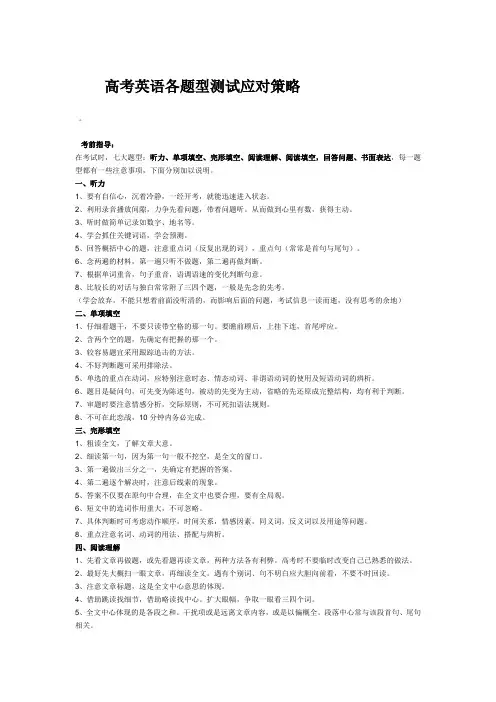
高考英语各题型测试应对策略。
考前指导:在考试时,七大题型:听力、单项填空、完形填空、阅读理解、阅读填空,回答问题、书面表达,每一题型都有一些注意事项,下面分别加以说明。
一、听力1、要有自信心,沉着冷静,一经开考,就能迅速进入状态。
2、利用录音播放间隙,力争先看问题,带着问题听。
从而做到心里有数,获得主动。
3、听时做简单记录如数字、地名等。
4、学会抓住关键词语,学会预测。
5、回答概括中心的题,注意重点词(反复出现的词),重点句(常常是首句与尾句)。
6、念两遍的材料,第一遍只听不做题,第二遍再做判断。
7、根据单词重音,句子重音,语调语速的变化判断句意。
8、比较长的对话与独白常常附了三四个题,一般是先念的先考。
(学会放弃,不能只想着前面没听清的,而影响后面的问题,考试信息一读而逝,没有思考的余地)二、单项填空1、仔细看题干,不要只读带空格的那一句。
要瞻前顾后,上挂下连,首尾呼应。
2、含两个空的题,先确定有把握的那一个。
3、较容易题宜采用跟踪追击的方法。
4、不好判断题可采用排除法。
5、单选的重点在动词,应特别注意时态、情态动词、非谓语动词的使用及短语动词的辨析。
6、题目是疑问句,可先变为陈述句,被动的先变为主动,省略的先还原成完整结构,均有利于判断。
7、审题时要注意情感分析,交际原则,不可死扣语法规则。
8、不可在此恋战,10分钟内务必完成。
三、完形填空1、粗读全文,了解文章大意。
2、细读第一句,因为第一句一般不挖空,是全文的窗口。
3、第一遍做出三分之一,先确定有把握的答案。
4、第二遍逐个解决时,注意后线索的现象。
5、答案不仅要在原句中合理,在全文中也要合理,要有全局观。
6、短文中的连词作用重大,不可忽略。
7、具体判断时可考虑动作顺序,时间关系,情感因素,同义词,反义词以及用途等问题。
8、重点注意名词、动词的用法、搭配与辨析。
四、阅读理解1、先看文章再做题,或先看题再读文章,两种方法各有利弊。
高考时不要临时改变自己已熟悉的做法。
高考英语解题指导一、听力听力考试具有极强的时间效应,听力过程不具备复制性,因此考生必须学会掌握一定的听力技巧,充分利用宝贵的每一分甚至每一秒钟。
总体来说,应该做到以下几点:1. 利用听录音前的时间,迅速地捕捉每个小题题干选项所提供的信息,预测短文或对话可能涉及到的内容,这样听录音材料时就有的放矢,有所侧重,提高答题的准确率。
2. 注意各选项中的主要区别。
你可能会看到一些不同的名字或地点或不同的动词,这些不同之处将会帮你确定这道题中哪些是你要听的关键,即关键词。
3. 克服犹豫不决的毛病,对自己有把握的试题应快速作答,对无把握的试题也要在所听信息的基础上排除错误选项,进行优化处理。
不会作答的,立即暂时搁置,准备听新的题目。
4. 注意听短文的首句和首段,文章的开首和开首段,往往是对短文内容的概括,如讲话目的、主要内容、作者、论点、故事发生的时间、地点及事由等。
5. 不管听什么材料,注意力一定要集中在整体内容的理解上,千万不能只停留在个别单词或单句上,听不清时马上放弃,不要强迫听清每一个词,要把重点放在听关键词即实词上,一边听一边把要点及回答问题的关键词记下来。
6. 保持良好的心态。
千万不要因为某些地方听不懂而心烦意乱,纠缠不休,一定要平静地听下去。
否则会导致既丢“芝麻”、又丢“西瓜”的被动局面。
此外,要重点掌握以下技巧:(一)预测技巧1. 对话预测在听取对话,尤其是A部分时,考生可以按照wh-问题进行预测,例如:(1) Who are the two speakers?(2) What is the possible relationship between them?(3) When did they have the conversation?(4) Where did the conversation take place?(5) What did they plan to do?2. 语篇预测在B部分的听力过程中,考生可按下列问题展开预测:(1) What is the topic of the passage?(2) Who is the speaker?(3) What facts did the speaker offer?(4) What facts did the speaker fail to offer?3. 依靠开篇句预测英语听力的第一句话通常会透露整篇的主题,所以考生要善于抓住听力材料的首句信息。
考前指导The only difference between good and better is a little more effort.1.高考细节题解题技巧细节理解类题目常见的设问方式:1.Which of the following is true/false/mentioned?2.What does the writer pay the least attention to?3.Choose the right order of the events given in the passage.4.All of the following statements may be true/false except…5.Which of the following is not the result of...?6.Which of the following best characterizes the main feature of...?7.Which of the following maps/diagrams gives the right position of…/relationship of..?8.Which of the following maps shows the right way to get to…?9.Which of the drawings below gives an idea of what…is like?解题方法(一)结构信息对应法高考中细节理解题主要考查考生在阅读语篇时获取事实性信息的能力,考生通过理解句子和段落的意思对具体的事实和细节做出正确的判断。
测试过程中要求考生从单纯的“信息获取”转变成“寻找答案”。
在这个过程中,原文涉及的大部分细节内容对于完成题目是无意义的,无需字斟句酌。
只有在阅读中准确把握题干的关键词,才能区分哪些字句与题目(答题点)有关。
所谓“关键词”是指题干中的核心词或者决定答案性质或位置的词。
典型的关键词是句子的主干、人名、地名、时间、数字和生词。
由于它们会在原文重现,因此产生了一种答题方法:回原文找关键词。
这往往给考生一种印象:只要在题干中划出关键词就一定能找到原词。
那么关键词一定会“原型”重现吗?请看下面例句:原文:While it is acknowledged for many years that an increasing number of animals are bound to become extinct,it is only recently that the problem has been addressed by politicians.题目选项:We have known for a long time that more species of animals will disappear.(正确答案)分析:题目中的每一个句子成分都“长得”与原文不同,可是表达的含义却一致。
我们把句子拆分观察:(1)While it is acknowledged for many years that = (1’)We have known for a long time that(2)an increasing number of animals=(2’)more species of animals(3)are bound to become extinct=(3’)will disappear1’ 是1的同意表达;2’ 是2的同意表达;3’ 是3的同意表达;因此,1+2+3=1’+2’+3’这是我们处理细节题的具体操作方法。
由上例可见,机械地用某个字回原文定位有时是徒劳的,换句话说关键词的重现并不是我们想像的“原词重现”。
根据笔者经验,关键词重现分成3类——AA语言重现、AA’语言重现和关系重现。
2.高考主旨大意题解题技巧这类题主要是测试学生对一篇或一段字的深层理解程度及在速读中准确把握主旨大意的能力。
一般针对某一语段或某一语篇的主题标题或目的设题。
常见的设题方式有:(1) Which of the following best describes the main point of the passage?(2) What is the writer trying to tell us?(3) Which of the following is the best title for the passage?(4) The purpose of the passage is. (5) The main (general) idea of the passage is.(6) The passage is mainly about ____. (7) What is mainly discussed in the passage?这类题通常围绕一个中心思想展开,一些一开头便展示出的中心思想,第一段常常是内容的梗概,同时又表达了中心思想,也有一些的中心思想贯穿全,并没有用一句话明确表达出,这就要求学生学会归纳概括。
每个段落往往也由一个主题句或几个陈述句构成,它们在句中的位置不同,有时在开头, 首先点明本段大意; 有时在结尾, 总结本段大意。
做这类题,首先要找出的主题句。
找出的主题句,也就明确了要讲什么,再通读全文,就可以把握的中心思想了。
主题句在整个语段中起着通领全段的作用,其它句子都是用阐述、解释、支持或发展主题句所表达的主题思想的。
其位置一般位于段首,也见于段尾或段中。
☆另外在许多段中,设有可以概括全段意义的主题句,必须根据中所提供的事实细节,进行全面分析,然后归纳成一般概念。
但必须注意,既不能以偏概全,也不能在概括时过于宽泛,要恰如其分。
这就需要进一步加工概括了。
〖第一招〗划出主题句和关键词在说明和议论时,根据其篇特点我们可以通过寻找短的主题句归纳出的主题。
主题句在中的位置通常有三种情况:开头、中间、结尾(含在开头结尾同时出现、首尾呼应的主题句)。
因此仔细阅读这类文章或段落的首尾句是关键。
做主旨大意类试题多采用浏览法。
浏览时,一般不需逐句浏览,只需选读的首段、尾段,或每段的首句和尾句。
重点搜索主题线索和主题信息。
有些的主题句或者说“眼”出现在的最后,此类往往以列举事实开头,通过论证,最后阐述核心观点,或者引用某个人的话印证自己的观点,以此归纳的主旨大意,所以有时要找出这样的信息,从中提炼标题或归纳大意。
〖第二招〗抓住段落大意,概括中心思想寻找整篇的中心思想是建立在寻找具体段落中心的基础上的。
各段落中心的整体归纳便是的中心思想。
在这个过程中,考生们不能只依据只言片语,或光看的某一些段落,而应该观察全文的结构安排,理解的重点,考虑中材料及支撑性细节是服务于什么的,分析故事的发展结局都是围绕什么中心安排的。
最后用简明扼要的字将的中心思想表达出。
〖第三招〗抓住主线和关键词语,归纳中心要注意不是所有的段落都有主题句,有时主题句暗含在句中。
阅读这样的,就需要自己根据的细节分析,概括出段落的主题,从而推导出的主旨。
分析的方法是:先弄清该段落主要讲了哪几方面的内容,这些内容在逻辑上有什么联系,然后加以归纳形成主题。
该题型提问的形式主要有三类:Main Idea型1.首先要找出的主题句(Topic Sentence),即中心思想,其他句子则为支撑句或扩展句(Developing Details),是用阐述、解释、支持或发展主题句所表达的主题思想的。
2.在许多段中,没有可以概括全段意义的主题句,必须根据中所提供的事实细节,进行全面分析,然后归纳成一般概念。
但必须注意:既不能以偏概全,也不能在概括时过于宽泛,要恰如其分。
Topic/Title型在阅读理解的命题中,有时要求确定相应的标题,以考查考生对全中心思想的理解。
1.首先要把握好大意,不能把某一段的大意看做是整篇的大意,更不能把细节看成是大意,以防标题的片面性。
2.注意的体裁及意图。
根据不同体裁,结合叙述的过程、说明的用途、议论的主题等,从而正确地确定标题。
3.注意标题本身的句法和语法特征:一是要言简意赅,引人注目;二是要利用省略等修辞手段,尽量使标题句法结构正确。
Purpose and Attitude型命题中常结合考生对的理解,考查对写作目的和作者态度的理解。
常见的设题方式有:The passage is meant to ______.The purpose of this article is ______.The author's attitude toward…is best described as one of ______.需要通过细节支撑的思想和大意,而作者正是通过这些思想和大意体现其态度、观点和目的。
因此,领会的态度、观点和目的与全文的主旨大意是密不可分的。
3.高考推理判断解题技巧提问方式:1) It can be inferred/ concluded from the passage that___________.2) According to the passage, ________________.3) We learn from the passage that ________.4) The passage impliesthat___________.5) Which of the following can be inferred from the passage?6) The writer suggests that___________.7) From the text we know that __________.8) What's the author's attitude toward……?9) The author uses the examples of... to show that___________.10) The author’s purpose of writing this passage is _____________.常用词汇:Infer, imply, suggest, conclude, indicate, appear.此类试题的提问中可能会出现情态动词:can, could, would, might或副词probably, most likely。
做题策略:推理判断题要在阅读理解整体语篇的基础上,掌握文章的真正内涵。
1. 要忠实于原文,以文章提供的事实为依据,从字里行间捕捉有用的提示和线索。
2. 把握句、段之间的逻辑关系,了解语篇的结构。